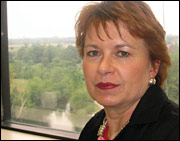Posted Sep. 1/05
Previous: Getting attention amid a sea of voices
Working locally and thinking globally.

- Susan Phillips, director of Carleton’s School of Public Policy and Administration and lead researcher at the Centre for Voluntary Sector Research and Development
Members of Carleton’s Centre for Voluntary Sector Research and Development (CVSRD) have brought this slogan to life by facilitating a new pan-Canadian network of organizations from the voluntary sector.
CVSRD, a research unit co-founded by Carleton and the University of Ottawa, serves as the secretariat for the Canadian Federation of Voluntary Sector Networks.
While member groups may be different in origin and make-up, they all have at least one common goal: to build healthier communities through a vibrant voluntary sector, says Susan Phillips, director of Carleton’s School of Public Policy and Administration and the CVSRD’s lead researcher.
The mass-networking effort is invaluable because it allows individual groups to share their research findings with hundreds of other members from British Columbia to Newfoundland, says Maureen Molot, CVSRD’s director and professor at Carleton’s Norman Paterson School of International Affairs. The federation could also promote dialogue through conferences, she adds.
“Our role is to facilitate the exchange of knowledge,” explains Paula Speevak-Sladowski, CVSRD’s managing director. “We’re a neutral broker that brings these groups together, while offering them our skills on organizational development and evaluation.
The impact for Carleton is that it demonstrates the benefit of linking university to community.”
Related to this initiative are two networks that link university researchers in Halifax and Ottawa with community practitioners. The Community-Based Research Network in Ottawa has attracted approximately 40 agencies, faculty and students, including people from Carleton’s School of Social Work. Incidentally, Carleton and Dalhousie University were the first in Canada to offer post-graduate courses in evaluating issues and management in the voluntary sector. The courses are part of Carleton’s Voluntary Sector Evaluation Research Project, which is funded by the Social Sciences and Humanities Research Council.
Speevak-Sladowski witnessed the results of such networking efforts a few years ago when the centre was hosting an event to bring together voluntary sector groups from across Ottawa. At the event were representatives of the dramatic arts community, environmental field and youth services, among others. While they all sat at the same table, it was difficult at first for these groups to find any commonalities, recalls Speevak-Sladowski.
But then it was discovered that all three groups were involved in helping a local high school recover from a string of teen suicides. While their programs were all unique, there were enough similarities to warrant further partnership, she says.
“It was a very exciting moment.”
Not only is it essential to improve ties between groups within the voluntary sector, but it’s also paramount to nurture the networks between the voluntary sector and various governments.
Policy-makers and voluntary sector practitioners must communicate, interact and work together effectively if governments are to make the right policy decisions, Carleton experts agree.
But what’s the best way to nurture this relationship?
Answering this question comprises some of the innovative work conducted by CVSRD and the brand new Centre for Urban Research and Education (CURE).
Christopher Stoney, professor of public administration and current chair of CURE, says that Canadian governments could do more to consult with citizen groups. Currently, a lot of federal initiatives involving municipal infrastructure, for example, seem to be centrally-driven and top down, he says.
One of the overall aims of groups such as CURE and CVSRD is to find ways in which to improve communication between the voluntary sector and governments and to find case studies on best practices.
Any time voluntary groups collaborate on projects, it’s giving the citizenry a much-needed voice, says Phillips.
“They’re building their policy capacity so they can dispute what governments say based on evidence. They can dispute such claims as, ‘Don’t worry, this dam won’t have any effect on the fishery.’ They can provide governments with valuable advice. The stronger voluntary organizations are the stronger democracy.”